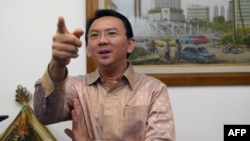Indonesia is the world’s third-largest democracy, but few minorities are represented in the diverse nation's halls of power. One exception is Jakarta’s straight-talking new governor, Basuki Tjahaja Purnama, who is spearheading a new political culture.
The beginning of Indonesia's transition to democratic rule began after the fall of former dictator Suharto in 1998, but some argue it has taken more than a decade for that transformation to be reflected in the country’s leadership, which had long come from the privileged elite.
This year, two politicians considered outside the privileged class are making their mark.
Joko Widodo, or Jokowi, Jakarta’s wildly popular governor - a common-man politician from a humble background - is set to be installed as Indonesia’s next president this October.
That transition makes way for Basuki Tjahaja Purnama, or Ahok, his no-nonsense, sometimes-brash deputy governor, who will now assume the reins of Jakarta.
As the first openly ethnic Chinese to lead the capital, Ahok said he has long fought against identity politics in the world’s largest Muslim-majority nation.
“If I used the common perception of politics in Indonesia, I would not have had the courage to join politics on this island. I could not be elected,” said Ahok.
Ahok first made a name for himself as a regent (mayor) in Bangka Belitung, an island province off Sumatra, before winning a seat in the national parliament in 2009.
A double minority, Chinese and Christian, Ahok recalls being labeled a kaffir, or infidel, when he first entered politics.
Indonesia is an open and democratic society but there is underlying resentment toward the often-wealthier ethnic Chinese, who have lived here for centuries and account for just over one percent of the population.
While Chinese Indonesians are well known in business, few have entered politics. During the fall of Suharto the minority group was brutally targeted in anti-Chinese riots. The memories from that time are still vivid.
Prominent businessman Sofyan Wanadi says Ahok’s success could reflect well on the ethnic Chinese, but added that it could also escalate underlying social envy toward the group.
“This is my problem because the sensitivity because of this Chinese. Because people are so jealous…They [Indonesian society] are always saying the Chinese are so successful in business, and now suddenly they like to do something in politics too… All these things are not good according to me. You have to show that you are not that nature, that you are Indonesian and what you can do for the country,” said Wanadi.
Several months ago a smear campaign against president-elect Joko Widodo, for example, which falsely painted him as Christian and Chinese, significantly diminished his popularity and almost cost him the presidency.
Leading the capital, said Ahok, is a chance for him to show that results and meritocracy trump identity politics.
“Jakarta is very important to me to show I don’t care if you are a Chinese descendent or what is your religion, all the country needs is a patriot who wants to sacrifice for the people, no corruption, no accept bribery, only obey the Constitution,” he said.
Ahok has developed a reputation for his hardline stance on graft - firing corrupt officials and implementing measures to curb the use of bribes.
He has also spoken out against religious intolerance and made tough decisions such as relocating street vendors and boldly closing Stadium, a notoriously debauched nightclub.
In a recent interview with Voice of America Ahok joked such measures make him Jakarta’s new ‘Godfather’ -- a reference to the paternalistic crime bosses popularized by Hollywood.
“The root of the Indonesian problem is corruption. Only that, it’s very simple. You know it’s like Stadium. Eighteen years and you have narcotics, everything or like Tanah Abang, prostitution, under 20 years old, everybody knows... Now its finished, demolished, including the narcotics... Now we are serious toward this,” he said.
Jakarta’s new governor is set to be installed next month and will remain in office until 2017.




